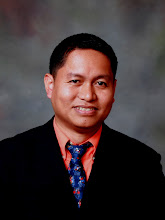Richard F. Wilson: Didaskalos, A Mentor, A Friend

I first met Dr. Richard Wilson during our guided reading seminars on Historical-Systematic Theology. During my first year in Asia Baptist Graduate Theological Seminary for my Th.D program in 2003, it was, indeed, a privilege for me--as well as for my three other classmates, Joey dela Paz, Roy Jabanes, and Enggar Objantoro-- a lifetime chance, to sit and interact, listen and learn from him. But what we did not miss was his willingness to listen and learn from us as Asian workers.
Though he is a "teaching theologian"(as he described himself) with considerable accomplishments in the field of academic research, his humility and intellect were co-equal, complimentary. As author and editor of many books, I could say that we were blessed to have one among the few, truly a didaskalos of no ordinary contribution to Christian ministry and leadership. Some of his major works are the following:
Rhythms: Sermons for a Community of Faith and Learning
Contemporary Gospels Accents: Doing Theology in Africa, Asia, Southeast Asia, and Latin America (edited with Danile Carro)
Mercer Commentary on the Bible, Vol. 1: Pentateuch/Torah (edited with Watson E. Mills)
Mercer Commentary on the BibleVol. 2, This History of Israel: Joshua-Esther (edited with Watson E. Mills)
Mercer Commentary on the Bible, Vol. 3: Wisdom Writings (edited with Watson E. Mills)
Mercer Commentary on the Bible, Vol. 4: The Prophets (edited with Watson E. Mills)
Mercer Commentary on the Bible, Vol. 5: The Deuterocanonical/Apocryphal Texts (edited with Watson E. Mills)
Mercer Commentary on the Bible, Vol. 6: The Gospels (edited with Watson E. Mills)
Mercer Commentary on the Bible, vol. 7: Acts and Pauline Epistles (edited with Watson E. Mills)
Mercer Commentary on the Bible, Vol. 8: The General Epistles and Revelation (edited with Watson E. Mills)
and Dr. Richard Wilson is one of the main contributors to the new Mercer Dictionary of the Bible (Ed Watson E. Mills). This later work did not received the least attention. It was given with the prestigious 1990 LMP AWARD INDIVIDUAL ACHIEVEMENT/SCHOLARLY REFERENCE. Walter Brueggemann, a teaching theologian of Columbia Theological Seminary, one of my well-liked OT scholar (see sidebar Theologians & Thinkers), commended this work when he said, "[The contributors are] first-rate scholars who hold in effective relation their faith and their impressive critical learning. In the midst of current controversy about the Bible, this publication stands boldly for sanity, intelligence, and moderation."
Another comment declares, "A modern, critical…one-volume Bible dictionary....Compared with [other Bible dictionaries] buyers will find some additional entries…as well as articles on virtually every noncanonical work included in recent standard collections. Some of the articles have helpful bibliographies, occasionally longer and more up-to-date than those of [other dictionaries]. If you feel you should buy just one,…take the Mercer Dictionary" (International Review of Biblical Studies). I could say no more than that.
There's no doubt, Biblical Archaeoligist placed the Mercer Dictionary of the Bible as a primary theological work, comprehensive work enough to gain the reputation as the “Best One-Volume Bible Dictionary” in its category: "This [Bible dictionary] is designed for students and the classroom, and it succeeds well with that audience. It has the best coverage of extrabiblical literature, and its articles are generally longer and supplemented with helpful bibliographies."
Having the Gospel Accents, Mercer Commentary on the Old and New Testament, and the Mercer Dictionary of the Bible--all of which are gifts from the author himself--added to my personal library are like keeping treasures of theological gems. If ever I have to give up a thousand books on my shelves and keep only ten, these four will be prime choices among others.
In the midst of our academic inquiry and labor to relate Christian faith with the community, we failed not to enjoy what we need to discover and re-discover in class and out of campus. We do have time to go and feel the ambiance of Baguio City, taste its delicacies, and smell the aroma of its wet market.
I also remember his crack of laughter along with us when I shared a story about a priest and his parishioner. It was during the Mass when the priest started to offer the bread to the people as they fall in line, waiting and taking turn to have their share of the bread. As usual, the priest extended his hands and said, "Body of Christ." He placed the wafer/bread inside the mouth and did it to the next, the next, and the next. Until the second from the last came, he said, "Body of Christ."
Then the last parishioner on the line stood before him. She was so beautiful, slim, and curvy. The priest stood petrified. Holding the wafer and offered it to her. And said, "Christ, what a body."
Though we all broke into laughter (and I still laugh or grin everytime I recall it), I still believe that doing theology is not all serious and "heady." Scholars of theology can go beyond teacher-student relationship or mere professionalism and specialization. Although this is common in the academic world. But what I like most about Jesus Christ, the ultimate didaskalos is that he called his disciples, his servants, his "learners" as his "friends" (John 15:14) . Jesus as a teaching theologian crossed the border of traditional elitism--which is characteristic of his time--by going deeper into the lives of his students. By mentoring and making them friends, Jesus touched his learners: head, heart, and hand...their whole being.
I cannot underestimate the power of influence, no matter how long or short time may be. But this one thing I know. I met a teacher whose influence is etched in my head, heart, and hand...my whole being.


1 Comments:
At 1:51 PM, Anonymous said…
Anonymous said…
Hi Glenn,
Did you inform Prof Rick about this post? If not please do and include a link to my blog... hahahahaha
Regards to the boys and Cay.
Blessings,
Joey
Post a Comment
<< Home